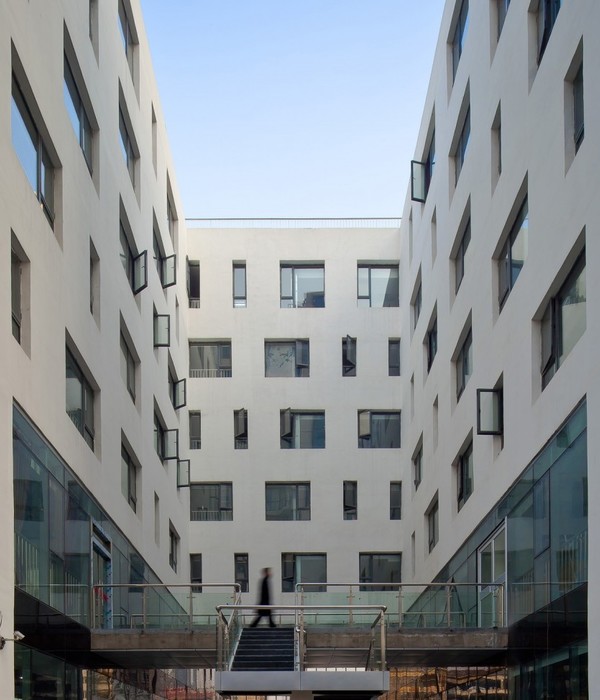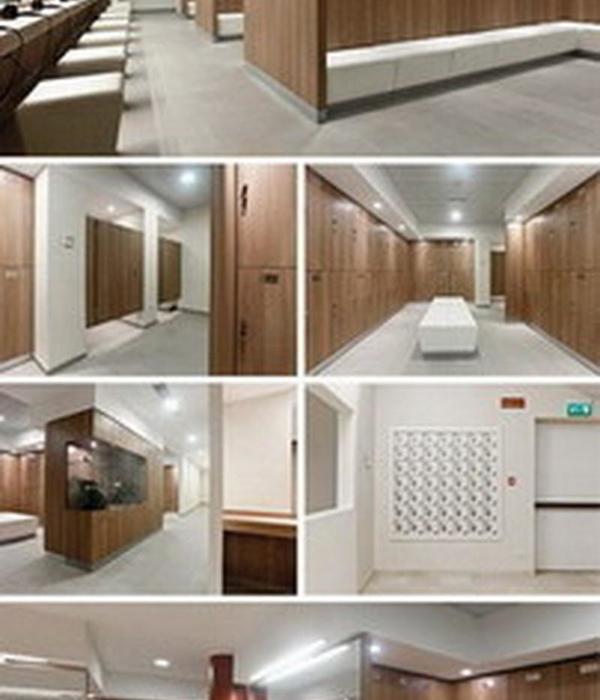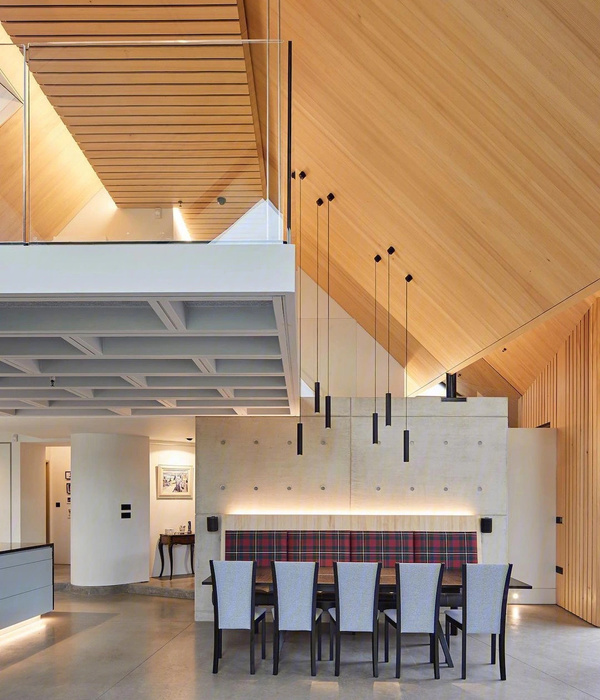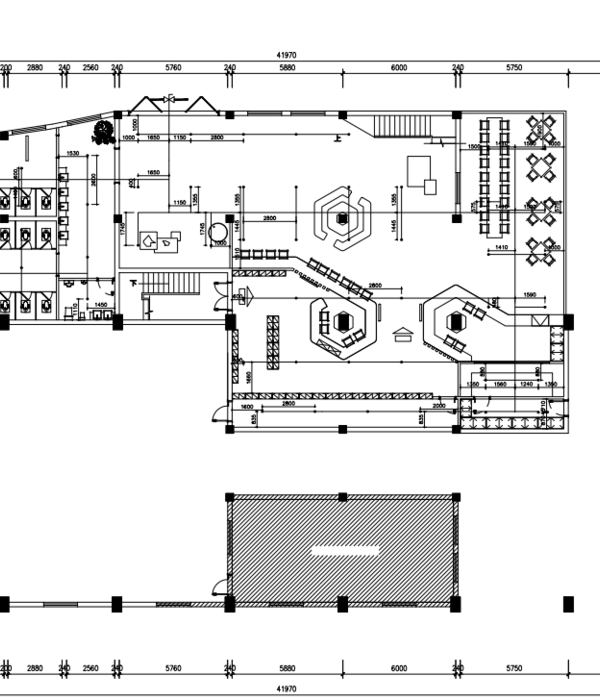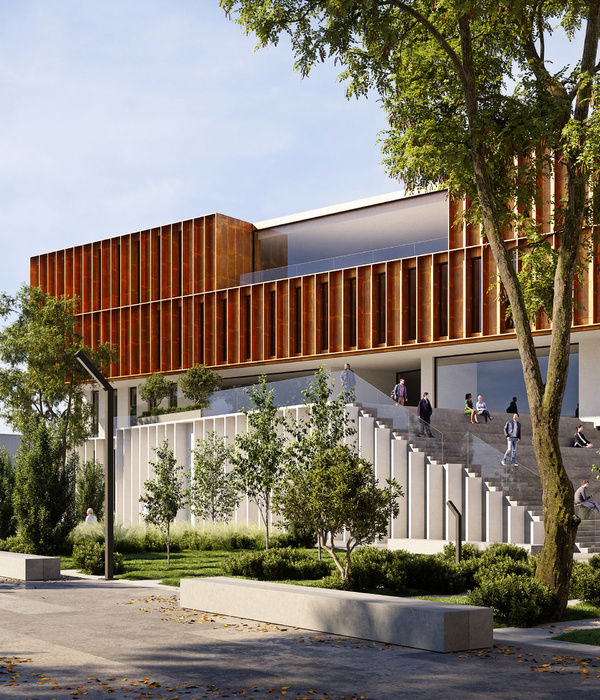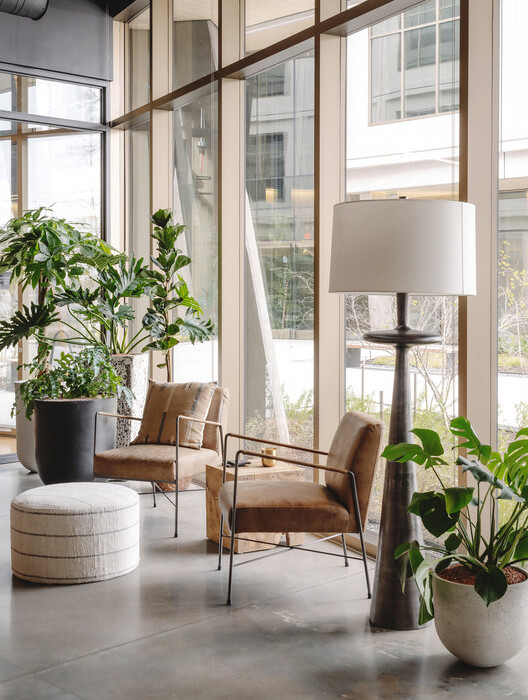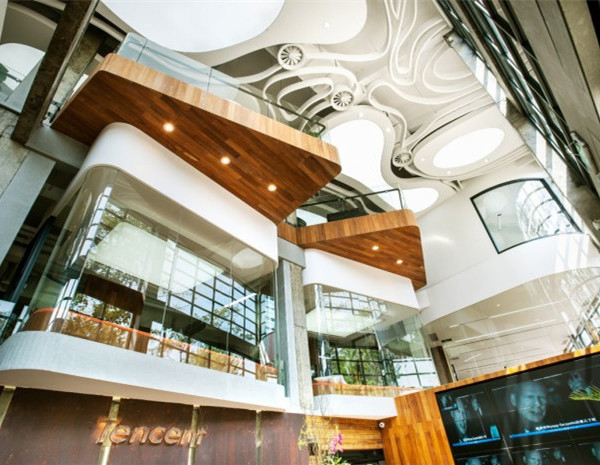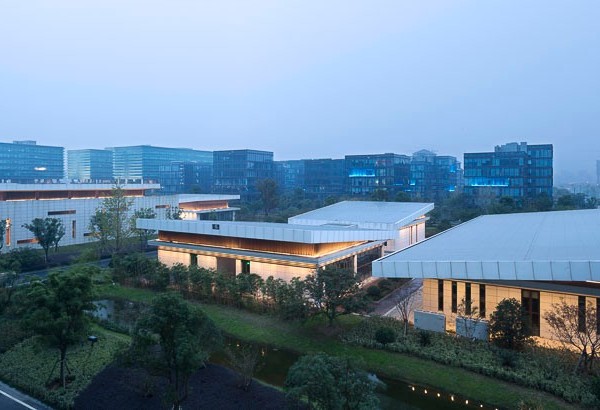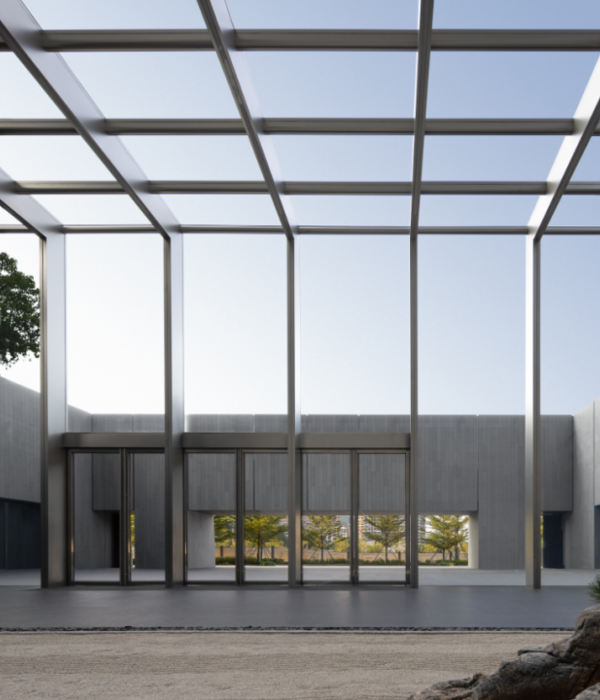WHOOSIS位于长沙潮宗街历史文化街区,近年来因多处文保景点的维护更新、现代建筑的涌入而重又熠熠生辉。潮宗街原为朝宗街,寓意朝拜祖宗,因旧时街口聚居着许多挑水工的脚夫,麻石路上终日淌满河水,“朝”逐渐演变成“潮”。而这一名称上的转变,对现如今老城更新后的社区群落、街道周边的丰富业态,也颇具时光的映照感。
▼项目视频,proejct video © 未来以北工作室
WHOOSIS store is in the historical and cultural district of Chaozong Street, Changsha. In recent years, the maintenance and renewal of cultural preservation and the influx of modern buildings have made it bright again. Chao (潮) was originally Chao (朝). The latter has the same pronunciation but a different Chinese character, meaning worship ancestors. Once there were many porters carrying water in the old street, the road was full of river water all day long, and gradually evolved into Chao (潮), the meaning of trend. This name change inadvertently foreshadows today’s urban renewal and flourishing business.
▼门头概览,storefront overview © 未来以北工作室
不入潮宗门,不进长沙城。如此琳琅满目和形态各异的街区场景,迎来城市活力的同时,也为设计带来一定的挑战。为了避免过多的造型设计,加剧街道社区的杂乱感,团队决定采用适度的减法,营造一个简洁宽敞的空间;延续原始场地充足挑高和规整空间的良好基础,打造较为明亮的基调,诠释WHOOSIS对长沙这座城市的态度: 提供一个开阔且有温度的场地,让人与事物在此自然生长有趣的创造力。
As the old saying goes, if you do not enter the Chaozong Gate, you are not considered to have entered Changsha City. Such dazzling and diverse block scenes bring vitality to the city. Also, it presents challenges to the designers. To avoid excessive design to aggravate the clutter of the community, Fon Studio decided to use moderate subtraction to create a simple and spacious space and utilize the original site with plenty of elevation and regular structure to create a brighter tone and interpret WHOOSIS’s attitude towards Changsha: to provide an open and warm site where people and objects can naturally grow pleasant creativity.
▼改造后的入口空间, entrance space after renovation © 未来以北工作室
▼入口,entrance © 未来以北工作室
▼朝向小巷的玻璃砖立面, glass brick wall facing to the alley © 未来以北工作室
除此之外,团队也在思考,如何利用并活化原有场地,以形成和而不同的新质感,暗合WHOOSIS从生活场景与文化热爱中汲取灵感的品牌精神。店铺东侧紧邻一组不可拆除的消防步道,团队通过拓展的设计思路,强化这个步道阶梯,让店铺与公共空间形成一种奇妙的衔接——既不影响原有功能,又能赋予原有步道更多的街头场景。而这个延伸出的阶梯,则成为设计的一个标志元素,经由等比例缩小后,自然而然地被引入至室内空间,成为一层至独立夹层的重要交通枢纽。
▼轴测剖面,sectional axon © 未来以北工作室
In addition, Fon Studio is also thinking about how to use and revitalize the existing site to form a new quality of harmony and difference. So that is consistent with WHOOSIS’s brand spirit that draws inspiration from life scenes and cultural love. The east side of the store is adjacent to a non-removable fire walkway. The team expanded this walkway ladder to form a chemical connection between the store and the public space – not affecting the original function but giving the original walkway more street scenes. This extended stair becomes a landmark element of the design. It is naturally introduced into the interior space after being scaled down and becomes an important transportation hub from the ground floor to the independent mezzanine.
▼消防步道,existed fire walkway © 未来以北工作室
▼消防楼梯被自然地引入室内, fire walkway steps naturally introduced into the interior space © 未来以北工作室
▼从吧台望向消防楼梯, view from counter to the fire steps © 未来以北工作室
▼室内概览,interior overview © 未来以北工作室
阶梯、地砖、门楣体块,透过立面玻璃延伸至室内,营造出天然活泼的流动感,模糊了室内外边界,增强了人与社区的互动性。展台、长凳、衣架等道具均以移动使用,灵活组合为前提而设计,根据不同的场景主题与售卖需求而变化,满足WHOOSIS作为一个复合功能场所的需求——一层进行常态陈列和售卖,夹层兼顾发售、展陈、演出、工作坊等不同功能。
The stairs, floor tiles, and lintel block extend into the interior through the glass facade, creating a natural and lively sense of flow, blurring the boundary between interior and exterior, and enhancing community interaction. Booths, benches, hangers, and other props keep on the premise of mobile use and flexible combinations. They are changeable according to different scene themes and sales forms. So that it can meet the needs of WHOOSIS as a composite functional place – the first floor for regular display and sale, and the mezzanine for sale, exhibition, performance, workshop, and other functions.
▼室内天然活泼的流动感, a natural and lively sense of flow in the store © 未来以北工作室
▼白色大理石马赛克,white marble Mosaic © 未来以北工作室
▼家具细节,fixture details © 未来以北工作室
长沙文化中的“霸蛮”特质,使城市氛围外化为“喧嚣鼎沸”。团队大面积使用白色大理石马赛克和暖灰色木丝吸音板作为主要材料,贯穿整个空间,来平衡这份“泼辣”;玻璃砖模糊了室外杂乱的拆迁场景,引入自然采光,带来更为舒适明净的体验感。然而“霸蛮”虽不喜循规蹈矩,却十分激越灵动,生猛活脱。大理石马赛克、不锈钢、花岗岩等质感较为硬朗的材料,回应了这种人文语境。几种不同调性的自然材料,经过简单处理后,呈现内敛而明快的基调;适度的减法,使店铺在整个街区的复杂构成中,形成了独有的松弛感。
Changsha culture has the characteristics of wild, which makes the city atmosphere externalized into noise. Fon Studio used a large area of white marble Mosaic and warm-gray wood wool acoustic board as the main materials throughout the entire space to balance the wild. The glass tiles blur the chaotic demolition scene outside, introduce natural lighting, and bring a more comfortable and clean experience. However, although the characteristics of the wild do not like to follow the rules, it is very dynamic and vigorous. Marble mosaics, stainless steel, granite, and other materials with relatively strong textures respond to this cultural context. Several natural materials of different tonalities present a restrained and bright tone. Moderate subtraction makes the store in the complex composition of the whole block, forming a unique sense of relaxation.
▼二层多功能区,2F multi-purpose area © 未来以北工作室
▼试衣间,fitting room © 未来以北工作室
▼平面图,plan © 未来以北工作室
项目名称:代谢中的老街_WHOOSIS长沙店设计 项目地址:长沙市中山路潮宗街 项目业主:WHOOSIS 空间设计:未来以北工作室 设计团队:金波安,李泓臻,罗霜华,张敬一,李晔莹,陆亦奇 施工团队:长沙打样工程研究所 设计时间:2023.02 – 2023.04 完工时间:2023.07 项目面积:300平米 项目摄影:未来以北工作室 项目视频:未来以北工作室 主要材料:大理石马赛克、木丝吸音板、不锈钢、花岗岩 主要品牌:灿好木业、艺术大师涂料、振阳石材有限公司
Project Name: The Old Block in Metabolism_WHOOSIS Changsha Store Address: Chaozong Street, Kaifu District, Changsha, China Client: WHOOSIS Design Company: Fon Studio Team: Jin Boan, Li Hongzhen, Luo Shuanghua, Zhang Jingyi, Li Yeying, Lu Yiqi Construction Team: The Sample Lab Design Period: 2023.02 – 2023.04 Completion: 2023.07 Building Area: 300㎡ Photograph: Fon Studio Video: Fon Studio Main Materials: marble mosaic, wood wool acoustic board, stainless steel, granite Main Brands: MinYu Wood, ShangYi Mosaic, Zhenyang Stone Lt,d
{{item.text_origin}}

